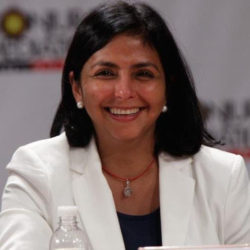Venezuela is celebrating the United Nations’ decision to continue the Good Offices process for another year to settle its border controversy with Guyana and has made it clear that it does not favour the matter reaching the International Court of Justice (ICJ).
This according to an article published on Venezuela’s Foreign Ministry website on Friday in reaction to a statement released by outgoing UN Secretary-General Ban Ki-moon. Ban’s decision is that the case will move to the ICJ if by the end of 2017 “significant progress” is not made.
The article quoted Minister of Foreign Affairs Delcy Rodriguez as saying on Twitter, “in the next few hours we will send the Secretary of the UN the reiterated position of Venezuela to reject the recourse to the International Court.” This newspaper has found nothing online to suggest that Rodriguez did indeed do so.

“The Chancellor emphasized that Venezuela ratifies its commitment to the negotiated solution of this controversy, and demands that Guyana comply in good faith with Good Offices which, by decision of the General Secretary of the United Nations, will continue for a final year, until the end of 2017, with a reinforced mediation mandate,” the article stated.
“It is the victory of the Bolivarian Diplomacy of Peace led by President Nicolás Maduro that maintained the position of Venezuela on Good Offices,” Rodriguez was quoted as saying.
It was stated that in this context, he emphasized that the Geneva Agreement which gives the Secretary-General of the United Nations the power to choose among the means of peaceful settlement contemplated in Article 33 of the Charter of the United Nations, “promotes the practical, friendly and satisfactory solution for both parties through negotiation.”
The article stated that Ban last Friday informed Maduro and Guyana’s President David Granger of his decision on the most appropriate steps to be taken to resolve the border controversy.
It was stated that Ban recalled that under the Geneva Agree-ment, during the last 25 years a Good Offices Process had been carried out under the Secretary-General to find a solution to the dispute. To date, this process has had the participation of three personal representatives of the Secretary-General but despite these efforts, it has not been possible to overcome substantive differences between the parties.
It was in this regard that Ban concluded that this process of Good Offices, which has been conducted since 1990, will continue in 2017, the statement said.
Guyana has accepted the decision announced and has called on the nation to support the process.
“The Government of Guyana accepts the decision of the Secretary-General. We stand committed to using our best endeavours to fulfil its highest expectations,” government asserted in a statement it issued shortly after Ban’s decision was made public.
Further, it added, “Guyana will do everything in its power to ensure that his expectations, and those of his successor to whom the mandate of implementation now falls – as well as our expectations are fulfilled. The Government calls upon all Guyanese to support the process that now lies ahead in the confidence that it will lead to a just and binding resolution of the discords that have plagued our development for so long. It is a fitting advance in this fiftieth year of our independence.”
The statement from the office of the spokesperson for the Secretary-General stated that Ban worked fervently over the year to find a way forward that would be most conducive to finding a solution. It noted that he held a trilateral meeting with the two presidents in the margins of the 70th General Assembly. High level missions were also dispatched to both countries and they held meetings with officials of both states.
Last month saw the Secretary-General conducting an extensive stocktaking of the Good Offices Process, the statement said. “On the basis of that stocktaking, the Secretary-General has reached the conclusion that the Good Offices Process will continue for one final year, with a new PRSG (Personal Representative of the SG) with a strengthened mandate of mediation, who will be appointed by the Secretary-General-designate shortly after he takes office,” the statement read.
“If, by the end of 2017, the Secretary-General concludes that significant progress has not been made toward arriving at a full agreement for the solution of the controversy, he will choose the International Court of Justice as the next means of settlement, unless both parties jointly request that he refrain from doing so,” it added.
The Secretary-General has discussed his decision with incoming Secretary-General António Manuel de Oliveira Guterres, and he expressed his concurrence with it, according to the statement.
Meanwhile the Alliance for Change (AFC) said last evening that it welcomed Ban’s decision and congratulated him for being “forthright in his choice of options to continue with the mediation process for another year.”
The party urged all political parties along with labour, business and other social partners to show support for this process as a prelude to protecting the integrity of Guyana’s sovereignty.
AFC also expressed appreciation to Granger, Vice President and Minister of Foreign Affairs Carl Greenidge and the entire Guyana team that lobbied the Guyana case, especially over the last 18 months since the assumption to office of the APNU+AFC Coalition Government.
Relations between Georgetown and Caracas have deteriorated since the embattled Venezuelan President issued the decree laying claim to most of Guyana’s Atlantic waters.
The Venezuelan decree had followed closely on the heels of an announcement by US Company Exxon Mobil of a significant oil find in Guyana’s waters off the Demerara coast. The Venezuelan decree laid claim to this area.




